News
Traders, services providers resist passing on cost reductions
View(s):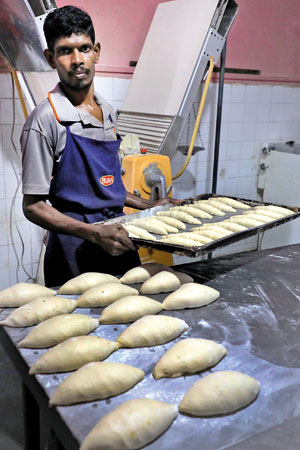
Bakery owners say they will not reduce prices because other costs remain high. Pix by M.A. Pushpa Kumara
By Kasun Warakapitiya and Senuka Jayakody
Consumer goods retailers and services providers are resisting passing on the reduced energy costs, noting higher expenditure on other things.
Last week, the wholesale price of wheat flour was reduced by Rs 85 as wheat flour imported by private traders reached the market. In the same week, 92 octane petrol was reduced by Rs 40, while super diesel was reduced by Rs 15.
On August 8, the price of a 12.5 kilogram gas cylinder was reduced by Rs 245 while that of 5kg and 2.3kg cylinders was reduced by Rs 99 and Rs 45, respectively.
Kandy resident N.M Nawfer, who lives in a rented premises in Colombo said daily expenses have risen even though the fuel price dropped. “Three wheel and bus fares are high. Bread is expensive despite the drop in wheat flour price.”
Kadawatha resident, Ranshika Lakshan who works in the private sector said that his salary has not been increased.
“The goods that we buy are costly. The shop owners say that transport costs, and electricity prices affect them.’’
Traders, transport providers, as well as bakery owners say they will not reduce prices because other costs remain high.
The Bakery Owners Association president, N.K Jayawardena said prices have not reached pre-coronavirus disease pandemic levels. “Before the economic crisis we bought a kilo of wheat flour for Rs 250, but due to shortages the price shot up to Rs 420 in previous months.’’
Mr Jayawardena said the price of butter and eggs remain high.
“Still some bakery operators buy flour from the black market paying Rs 300 for a kilo of flour. Even the two wheat importers sell for Rs 285 to Rs 320. We cannot drop our prices,’’ he said.
An importer who claimed anonymity said that the price dropped with the arrival of Turkish wheat flour. Even though a kilo is Rs 265, prices will drop further with more supply.
He said the bakeries are resisting until market pressures force them to reduce prices.
An owner of a bakery in Slave Island, K. Thillainathan said the flour import duopoly is selling at high prices and only provides 30% of the requirement.
“There is a shortage of flour. We cannot choose cheaper flour imported by the Pettah traders as we fear the companies might blacklist us and not provide us flour later,’’ he said.
Mr Thillainathan said employee numbers had to be cut from 16 to five because of the rising prices of wheat, electricity, eggs, baking powder, and yeast.
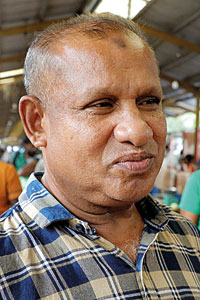
N.M Nawfer
He said that he uses electric dough mixers, two diesel bread ovens and a gas oven for baking cakes. Although gas and diesel prices have been reduced, prices still remain high.
Transport providers, too, said fares cannot be reduced.
Three-wheel operators said that the fuel quota is inadequate.
The All Island Three Wheeler Drivers Union secretary, T. R. Pallie said five litres of petrol a week is not enough. This is enough to drive 125 kilometres a week.
“This means we can only drive 18 kilometres per day and run a few hires. We operate in fear that fuel would run out during a hire,’’ he said.
He said operators also use their three-wheelers for daily activities such as taking their children to school and going to the market.
The three-wheel driver associations have asked for an increase in the fuel quota in talks with the Transport Minister, the Minister of Power and Energy, and National Transport Commission on July 8. The associations were asked to make a list of three-wheel operators.
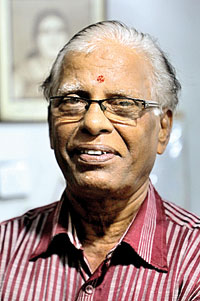
Bakery owner K. Thillainathan
They gave a list of 25,000 operators, while provincial councils gave another list of 10,000 to the Ceylon Petroleum Corporation (CPC) by the end of the third week of July.
However, the CPC had rejected the applications claiming they need more details.
The Joint Three Wheeler Service Union, too, had written to the Minister of Power and Energy last week asking for an increase in the weekly quota.
School van and bus operators said vehicle maintenance costs have not decreased.
All-Ceylon School Children Transport Association (ACSCTA) secretary Lalith Chandrasiri Fernando said: “The prices of spare parts have increased by 300%, but we cannot avoid maintenance.’’
Mr. Fernando said the quota of 20 litres for a school van and 40 litres for a school bus is insufficient. Some parents provide them with fuel from their weekly quotas, he said.
The chairman of the Consumer Affairs Authority, Shantha Niriella told the Sunday Times that they suspect that the flour prices remain high as retailers are trying to create an artificial shortage.
“We have started investigations. We are also aware that intermediaries who buy from wholesalers, too, increase prices,” he said
The CAA has planned a meeting with bakers to discuss prices.
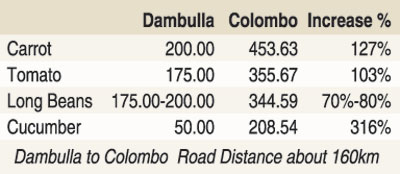 | 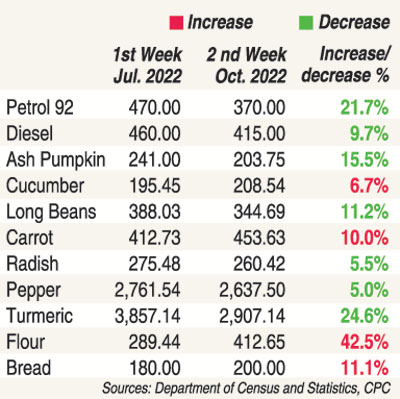 |
| Veggie traders stuck with high transport costs Vegetable traders say transport costs remain a big burden despite the recent reduction in the price of petrol and diesel. They say lorry drivers claim that the Rs 15 super diesel price cut is negligible and they can’t lower their prices. Three-wheel operators who deliver goods to markets also charge more even though the fuel price has been reduced by Rs 40. Pettah vegetable market vendor, K.T.U. Mallawarachachi, 45, said transport costs have risen. “Before the fuel prices increased, I paid Rs 800 for the lorry from Kelaniya to Colombo But now, I have to pay Rs 2,000,’’ he said. Vegetable traders at economic centres said the reduction of diesel by Rs 15 is not significant, compared with earlier price increases for petrol 92 and auto diesel by Rs 50 and Rs 60, respectively. Dambulla Economic Centre Traders Association president Shantha Ekanayaka said lorry drivers are demanding more. He also blamed middle men who buy vegetables at wholesale prices and sell at higher prices to retailers, claiming high transport costs. “This is how vegetables bought for Rs 200 increase to Rs 500 after they reach Colombo,” he said. 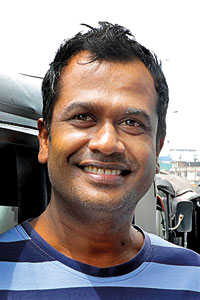 Suranga Perera, three-wheel driver  Rangana Silva, bus driver No room for lower fares Private transport services operators refuse to reduce fares despite the price cut for 92 octane petrol and super diesel by Rs 40 and Rs 15 respectively. Suranga Perera, a three-wheel driver at the Pettah vegetable market, said he has to earn for his family of six. “I have four daughters and my wife to feed from what I earn. But, I get only five litres.’’ He charges Rs 100 for the first kilometre and Rs 120 from the second kilometre onwards. He had decided to reduce Rs 20 from the fare. Private bus drivers at the Pettah private bus depot said that the Rs 15 diesel price cut is not enough for them to reduce fares. Rangana Silva, a driver of a bus operating between Aluthgama and the Pettah, said spare parts have become costlier. “Now a bus tyre costs about Rs 150,000, Earlier it was Rs 30,000. The prices of spare parts have increased. What we earn is not enough for maintenance,’’ he said. The Rs 15 fuel price reduction means they can get more diesel worth Rs 600 to Rs 700.
| |
The best way to say that you found the home of your dreams is by finding it on Hitad.lk. We have listings for apartments for sale or rent in Sri Lanka, no matter what locale you're looking for! Whether you live in Colombo, Galle, Kandy, Matara, Jaffna and more - we've got them all!

